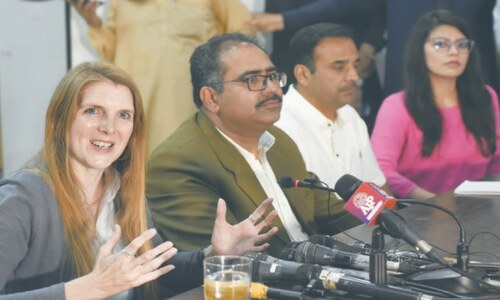ISLAMABAD: Food insecurity caused by climate change is making different gender groups, particularly women, vulnerable, Parliamentary Secretary for National Health Services (NHS) Dr Nausheen Hamid said on Monday.
At a ‘National Workshop on Building Nutrition and Resilience – Incorporating Gender and Climate Change’ organised by Action Against Hunger (ACF), Dr Hamid said education, literacy and other indicators of women’s empowerment are related to the improved nutrition status of their children.
She sad an urgent policy response is needed which requires coordinated action among all stakeholders.
Chairing the session on nutrition and climate change, Senator Sitara Ayaz – who chairs the Senate Standing Committee on Climate Change – said that Pakistan is particularly vulnerable to food insecurity due to its geopolitical position and climate risks.
National workshop held on nutrition, climate change and food security
She said Pakistan is the eighth most vulnerable country to climate change. Temperatures in the country are rising and extreme weather and climate events are becoming more frequent and severe.
During the second session on climate change and nutrition, Pakistan Agricultural Research Council Chairman Dr Mohammad Azeem Khan emphasised climate change dynamics connected to nutrition and food security.
He highlighted the impact of climate change on crops and the impact increasing disasters have on the food security situation.
National Disaster Management Authority (NDMA) Member M. Idrees Mahsud highlighted how Pakistan is prone to natural disasters due to climate change, leading to the loss of lives and property.
He also spoke about the NDMA’s role and how different policy interventions can improve disaster risk reduction strategy.
ACF Regional Director Christopher Golden said the fact that the workshop was taking place in Pakistan this year was an affirmation that the idea of sustainable development and eradicating hunger has gained importance despite increasing the arms race and economic competition among powerful countries and the understanding is growing for powerful companies to work together to overcome poverty by taking relevant policy actions.
The director of the Ministry of NHS’ Nutrition Programme Dr Baseer Achakzai, who attended the event, told Dawn that stakeholders such as the World Food Programme, World Health Organisation and government of Pakistan should work collectively because joint efforts will be more productive.
“Two kinds of approaches should be adopted. The first one is nutrition specific, such as giving awareness to mothers that exclusive breastfeeding is the best nutrition for babies.
“The second approach is nutrition-centric, in which awareness should be given that clean drinking water should be used and every child should be vaccinated,” he said.
Published in Dawn, December 10th, 2019














































Dear visitor, the comments section is undergoing an overhaul and will return soon.